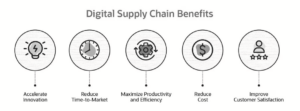Disruption, and economic pressures to decrease costs without impacting business outcomes, have forced many large shippers to rethink how quickly they plan to optimize supply chain procedures. Unfortunately, in today’s world, emerging risks can no longer go unchecked.
In hopes to lower supply chain costs and improve supply chain resilience and sustainability, shippers have accelerated innovation efforts and are set to increase supporting budgets over the next 2 years. As a result, shippers have made supply chain digitization a major company priority with goals to advance and optimize order fulfillment, customer experience, and transportation management.
So what’s the difference between a traditional versus digitized supply chain?
Although traditional supply chains use technology, the technology is usually standalone and lacks integration. A digital supply chain removes silos and provides seamless transparency for all supply chain teams. Another major difference is that traditional supply chains leverage historical data, whereas digital supply chains use real-time data. Real-time insights are important when making transportation management decisions because of freight market volatility. Lastly, traditional supply chains move slow because they involve manual processes. Digital supply chains use technology that replaces manual work with automation, and even better… if automation is powered by machine learning the shipper is armed with AI to dynamically pivot with little notice as disruption occurs. In the end, when the supply chain is digitized, shippers reduce time-to-market, maximize productivity, reduce cost, and most importantly improve customer satisfaction which feeds into the bottom line.

Supply Chain Digitization Example [AI-Powered Freight Procurement]
Award-winning software has advanced and automated transportation management, also known as freight procurement. AI-powered technology eliminates the hours-long, manual process of sending emails and making phone calls to find, vet, and secure a carrier to move loads. When shippers choose to digitize and automate processes, like freight procurement, they are more likely to deliver goods on time, while paying a fair market cost.

